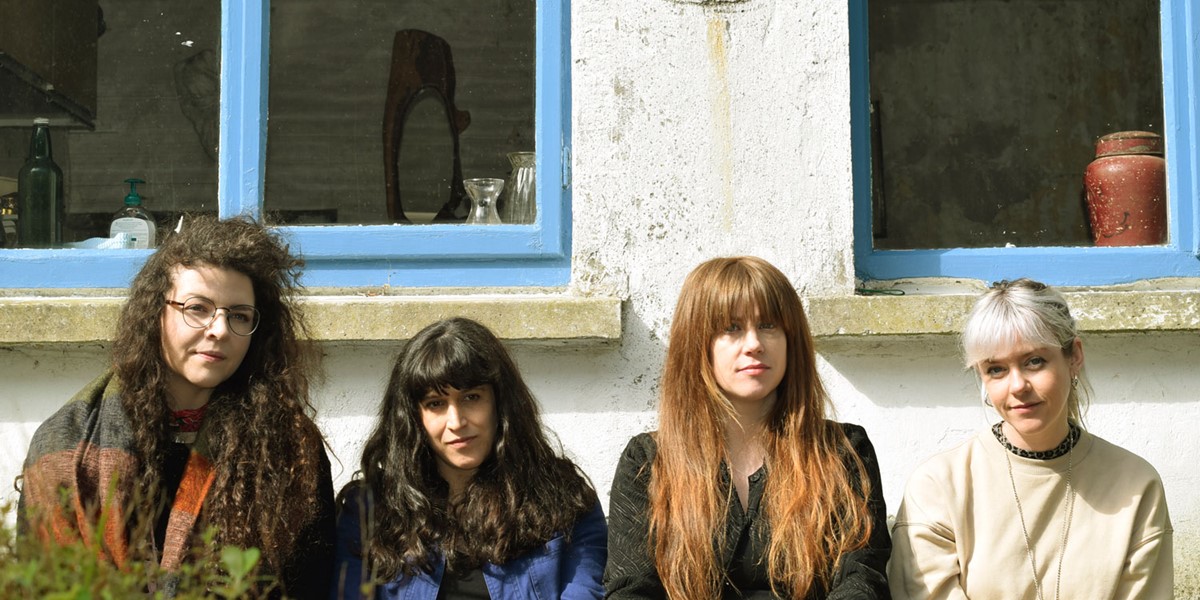Thursday, May 9, 2024
Landless: “We don’t spend time trying to sound the same as each other… we each have our own accents”
By Emma Rycroft
Irish vocal group Landless follow-up their much-loved debut album with a new set of songs focused on female protagonists. Emma Rycroft finds out its harmonious story

Landless (photo: Cormac MacDiarmada)
The four members of Landless – Ruth Clinton, Sinéad Lynch, Méabh Meir and Lily Power – had known each other through various sessions, Clinton explains, before they came together for a traditional singing performance at a festival in Drogheda. “We didn’t necessarily have ambitions to record or perform or anything, but it was kind of organic,” she says of the group’s development.
They are now set to release their second album, Lúireach (meaning Breastplate or Hymn for Protection), their first with Glitterbeat. It is themed around new and traditional songs which tell women’s stories. “We’re in our Brigid’s era for sure,” says Power, citing the Irish saint, symbol of feminism and patron of healers and poets.
Landless’ first two releases – 2014’s self-titled EP and 2018’s debut album Bleaching Bones – were completely a capella, but Lúireach sees them bring in instrumentation. “[We] had been incorporating pipe organ [live] because I’m an organist,” Clinton recollects, “we’d get invited to sing in churches a fair bit because it suits the sound, so if there was an organ in the room, we’d make use of it. So that part was already present, we just hadn’t recorded it. [Méabh] was saying that with our previous album we recorded in churches and particularly reverberant rooms, so that was the fore… This time around, we wanted a bit of a closer vocal thing. So, we were doing it in the studio and then it made sense to add a bit of instrumentation. And I suppose because we’ve got access to these great musicians as well, like [Lankum’s] Cormac [MacDiamarda] and Alex [Borwick], who were willing to contribute to it.” They are keen to acknowledge, too, the work of longstanding manager Vincent Dermody and producer John ‘Spud’ Murphy (Lankum, ØXN), who also produced Bleaching Bones, in this new work.
The instrumentation is well arranged, with restraint. Traditional song ‘The Grey Selkie of Skerry’ features long single chords and notes from Clinton’s pump organ, just when the tragic denouement is reached, lifting feeling at the right moment. ‘The Fisherman’s Wife’, written by Ewan MacColl and recorded with Peggy Seeger’s permission, describes a woman left behind on land, her work unacknowledged by her fisherman husband and community. An eerie, staccato piano note persists behind first a single, lonely voice, and then all four voices, powerfully coming together.
There are also songs that remain purely vocal – listen out for the lilting ‘Blackwaterside’, an unusual version learnt from Traveller Paddy Doran. The chorus, with its alternating rhythms, is magic. Throughout Lúireach, the audible contrasts between each voice in Landless are striking. Especially as these different timbres and deliveries create harmonies that ring. “We don’t spend time trying to sound the same as each other,” says Clinton. “I know other vocal groups will really work on having the same pronunciation and everything like that, whereas we kind of, we have our own accents… when we’re using ornamentation in our singing, we’ll all do that freely as it comes to each of us. We’d never get into the weeds of making sure we all sing like just one voice. I don’t think we’ve ever been interested in doing that.”
Lúireach’s closing track, ‘Ej Husári’, is particularly interesting as the album’s only non-Irish song. “We’ve gone over to Slovakia a couple of times, to this festival in the Tatras Mountains, and we’ve done the singing workshops there, and their vocal style is so different to ours,” explains Clinton, “It’s very strident, you know, belty… and this song, which they taught us at the time but also comes from an archival recording… it’s closer to our own style of singing… we performed it while we were over there and I think the people were kind of like, ‘huh!’, bemused by it because we sort of Irish-ified it.” Lynch adds, “it’s actually a song about a woman who’s desperately looking for her lover, her tsar, who’s been killed. But it sounds very lullaby-ish… It’s really beautiful. And it’s nice to try and sing in a different language.” It starts off almost as a hymn – with a single, high, soft voice before, as Lynch notes, the voices disperse into a calming, lullaby-esque croon, with support from a shruti box and MacDiarmada’s strings. A soothing end to an album of songs that, as Lynch puts it, Landless have “live[d] with” before setting to record.
This article originally appeared in the June 2024 issue of Songlines. Never miss an issue – subscribe today

